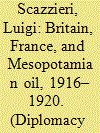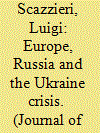| Srl | Item |
| 1 |
ID:
137372


|
|
|
|
|
| Summary/Abstract |
This analysis centres on British and French policies concerning Mesopotamian oil between 1916 and 1920. Both Powers already had some degree of interest in oil matters before the war, but these concerns did not leave a particularly strong imprint on the Sykes-Picot Agreement of 1916. During the First World War, both Britain and France became aware of their lack of oil and identified Mesopotamian oil as a key war aim. Both Powers developed close relations with Royal Dutch-Shell to further their oil policies. After the war, the struggle for oil proved inseparable from the territorial settlement in the Middle East and relations with oil companies. All actors did not initially recognise this fact, and it was only during 1919–1920 that an increasing awareness developed that oil and territorial issues were inseparable. Combined with changes in political leadership, it made possible a “silent compromise” at San Remo in April 1920.
|
|
|
|
|
|
|
|
|
|
|
|
|
|
|
|
| 2 |
ID:
153045


|
|
|
|
|
| Summary/Abstract |
This article analyses European strategy towards Russia during the Ukraine crisis between February 2014 and December 2015, conceptualising it as a coercive diplomatic strategy and analysing the relationship between its ends, ways and means. European strategy sought to reverse Russian intervention. However, this overarching aim was flanked by two ‘constraining’ aims of avoiding an escalation of the conflict and a breakdown of relations with Russia. The strategy shifted between these aims, which proved to be irreconcilable: while the EU partly succeeded in containing the conflict, it failed to reverse Russian intervention and relations between the EU and Russia deteriorated sharply.
|
|
|
|
|
|
|
|
|
|
|
|
|
|
|
|